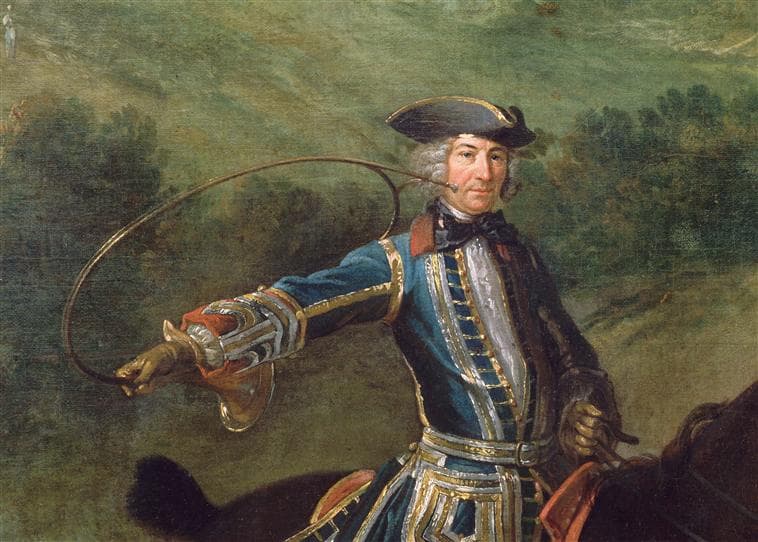When it comes to the intersection of gender and musical instruments, the harp is often discussed.
For a variety of reasons, many of the greatest harpists in history have been women. We even wrote an article about why male harpists were so rare.
At the same time, music history often records a dearth of women composers.
So that might make a person wonder…
Were there any women composers who wrote music for the harp?
The answer is yes!
Here are the stories of three extraordinary women composers who played harp and wrote harp music.
Amélie-Julie Candeille (1767-1837)
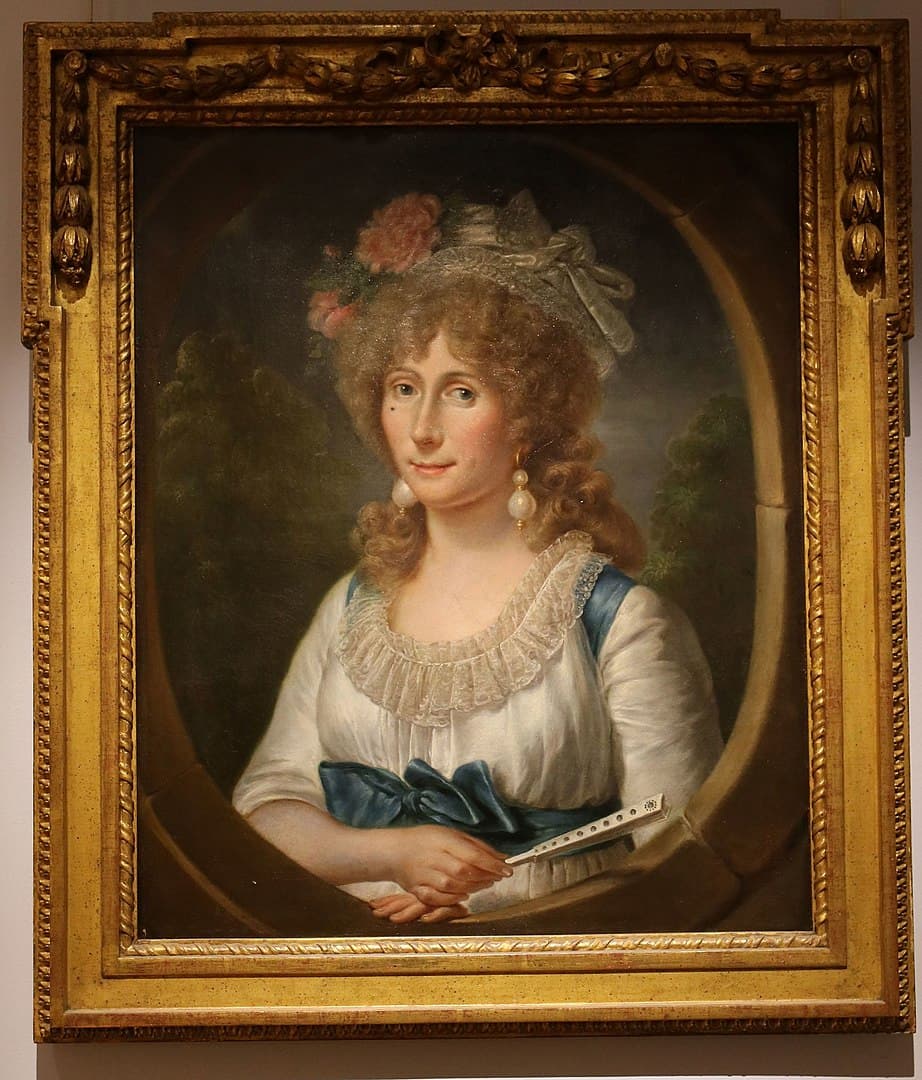
Amélie-Julie Candeille
Amélie-Julie Candeille (often referred to as Julie Candeille for short) was born into a creative family. Her father Pierre-Joseph Candeille was a composer and actor who oversaw her musical education.
She made fast progress in her studies. At fifteen, she made her singing debut at the Paris Opera. At sixteen, she made her piano debut at the Concert Spirituel. At seventeen, she premiered a piano concerto that she’d written.
As if that wasn’t precocious enough, she also took the stage as an actress and playwright. In 1792, she composed a comedic opera named Catherine, ou La belle fermière. She cast herself as the lead and performed her airs while accompanying herself on the harp. Catherine was performed 150 times over the next four decades.
Amélie-Julie Candeille (1767-1834): Sonata 1 in G-Major, Opus 1
She was denounced during the French Revolution, but luckily survived. After the Terror, she married a doctor, Louis-Nicolas Delaroche. Later, she divorced him – and broke a theatrical gig – to pursue and marry Jean Simons, a man who built lavish coaches for wealthy people. Before all was said and done, she also was married a third time, to a painter named Hilaire-Henri Périé.
She spent her later life writing, composing, and encouraging young musicians, especially women.
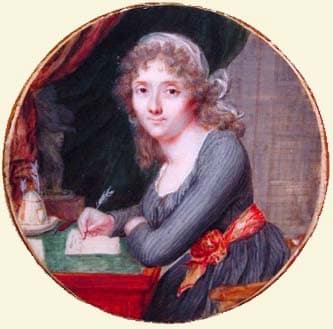
Amélie-Julie Candeille
Shedding light on the frustration she felt about balancing her work and personal life, she once wrote: “When you can devote yourself to studying something you love, it is an intense pleasure: but if you have chosen a vocation for which every possible obstacle stands in your way, the simple desire to work becomes a tormenting passion, a torture of every moment, an unbearable constraint.” It’s a relatable sentiment to a lot of creative people, especially women, even today.
Sophia Dussek (1775-ca. 1831)
Sophia Dussek was born Sophia Corri, daughter of Italian composer, publisher, and impresario Domenico Corri, in 1775. He taught her music from an early age, and she began composing music when she was very young.
In 1788, at the age of thirteen, she moved to London, where she studied with castrato Luigi Marchesi and composer Giovanni Battista Cimador.
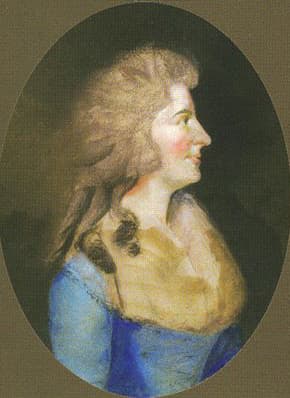
Sophia Dussek
In 1791 she made an auspicious London debut, with none other than Joseph Haydn accompanying her on the harpsichord! The following year, she sang at the 1792 premiere of Haydn’s “The Storm” and later, the London premiere of Mozart’s Requiem.
In 1792, when she was seventeen, she married fellow composer and concert partner Jan Ladislav Dussek, who was thirty-two.
Within a few years, their marriage began breaking down. There’s a legend that in 1796, Sophia stored her belongings in her harp case and fled to a lover’s house. Dussek followed her. A blow-up ensued, in which Sophia confessed she was pregnant by her lover. Dussek supposedly let her choose which man to stay with, and the offer impressed her so much that she returned to him. This story may not be true, but it’s certainly memorable, and, if nothing else, it demonstrates her reputation as someone who wouldn’t hesitate to take the course of her life into her own hands.
Sophia Dussek, Sonata for the harp in c-moll op. 3 n. 3 (1797)
The Dusseks had a daughter named Olivia in 1799, who also became a harpist and composer.
In 1812, Jan Ladislav Dussek died. Sophia remarried a violist named John Alvis Moralt.
All that said, despite the many famous stories about her love life, that was not the most intriguing thing about her. She published a great deal of incredibly lovely music that bridges the stylistic gap between the Classical and Romantic eras, and it’s worth a listen by every classical music lover.
Sophia Corri Dussek: Music for Solo Harp
Henriette Renié (1875-1956)
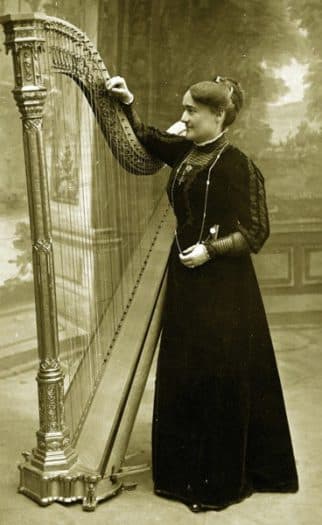
Henriette Renié
Henriette Renié was born in 1875 in Paris. She began piano lessons with her grandmother when she was five, but she found her true calling in 1883, when she started playing the harp.
Her musical development was astonishing. In 1884, after only having played the harp for a year, she was admitted to the Paris Conservatoire.
In 1885, she won the second prize in harp performance. She would have won first, but if she’d won first, she would have been ineligible to continue to study at the Conservatoire, so the jury downgraded her prize.
In 1886, she won the Premier Prix. She was only eleven, and already one of the greatest instrumentalists the school had ever seen. She continued studying at the Conservatoire throughout her teens.
In 1901, she premiered her Concerto in C Minor for harp, and in 1902, an ambitious harp solo called “Légende.”
Henriette Renié – Harp Concerto
She was part of the first radio broadcasts from the Eiffel Tower, and in 1926 she began making recordings. They were sensations and sold out.
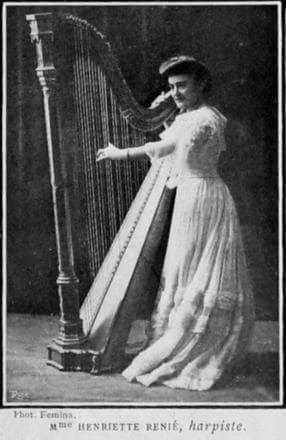
Henriette Renié
Poor health, including recurring bronchitis and digestive trouble, made it difficult for her to perform later in life. When performing became difficult, she focused on teaching and writing her own harp method.
In 1955 she announced that she would be giving her last performance of “Légende.” Career completed, she died in March 1956.
She had a long and incredibly prestigious career, and through teaching and performing, she succeeded in supporting herself and her family financially. She never married or had children, so, sadly, after her death she did not have a family to promote her legacy. Combine that with a naturally humble personality, and her work never got the foothold that it deserved in the
repertoire. Maybe modern musicians and music lovers can fix that.
Henriette Renié – Légende for Harp (1904)
For more of the best in classical music, sign up for our E-Newsletter

